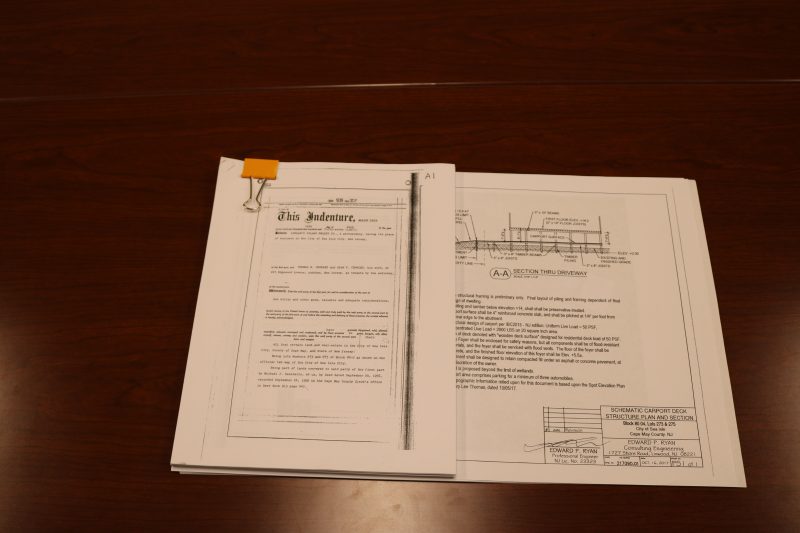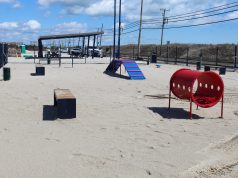
By DONALD WITTKOWSKI
Tucked behind the tall marsh reeds at the end of 81st Street is muddy, nondescript property overlooking the back bays of Sea Isle City.
While the city considers part of the property to be within a wetlands conservation zone protected from housing construction, the private owners want to use half of it to build a vacation home.
Both sides are now involved in a lawsuit that could decide the fate of the property, but it appears they are moving closer to a settlement.
“We have not settled the case yet, but offers have been going back and forth in good faith,” City Solicitor Paul Baldini said.
City Council met in closed session Tuesday to discuss the litigation. Baldini said he is prevented from discussing specifics of the settlement talks while negotiations continue.
“There are some things that are still up in the air,” he said in an interview Wednesday.
The property owners, Shirley A. Kling and Terrance L. Crowley, had sought a variance from Sea Isle’s zoning board in 2019 to build a single-family vacation home on the land.
In a 5-1 vote at a meeting in June 2019, the zoning board refused to grant the variance after expressing concerns about flooding in the neighborhood. The board members also said they did not want to set a precedent by allowing a new home to be built in a wetlands conservation area.
During the board meeting, opponents lined up to testify against the proposed home. They expressed fear that the project would harm the environment and exacerbate flooding in the surrounding neighborhood.
Kling and Crowley had argued that their project “satisfied all criteria” for a variance and would not have a negative impact on wetlands, flooding, threatened or endangered wildlife or other environmental concerns.
After they were turned down, Kling and Crowley filed a lawsuit in 2019 that alleged the zoning board was “arbitrary, capricious and unreasonable” in its decision to reject the variance. They asked a Superior Court judge to overturn the board’s ruling, but their appeal was denied.
Now, in a potential breakthrough in the litigation, Kling and Crowley have filed an application to have the Cape May County Open Space Board buy their property. Sea Isle, which has consented to the application, has been discussing the possibility of leasing the property from the county if the open space board buys it and transforming it into a public kayak launch site, Baldini said.
Robert Baranowski, a Marlton, N.J., attorney who represents Kling and Crowley, said the property has been assessed at $875,000. Whether the county or city would agree to buy the property for that price remains part of the negotiations.
“Hopefully, we can all come to terms,” Baranowski said Wednesday. “There is litigation pending and we are trying in good faith to resolve it.”

The city is discussing the possibility of building a small kayak launch site on the property, including a ramp that would give public access to the bay waters in Townsends Inlet. It would be separate from the city’s fishing pier and kayak launch site opening this spring near 60th Street at the Dealy Field recreation complex.
Baranowski said Kling and Crowley approve of the idea of the city or county acquiring their land and turning it into a kayak launch site “that would be there for generations.”
Baldini hopes the open space board will look favorably upon the proposal because it “fits with the theme” of using land that is located in a wetlands conservation zone for recreation. The board is expected to consider Kling and Crowley’s application on March 23.
Under Sea Isle’s zoning laws, areas that are designated for wetlands conservation are restricted to “recreational fishing and crabbing, boating, passive recreation and environmental study.” Home construction is not allowed in those areas.
The lot that Kling and Crowley have proposed to develop for their vacation home is unusual because half of it is zoned for housing construction, while the other half lies within in the wetlands conservation area.
Kling and Crowley actually own two adjacent bayfront lots. They have been owned by their families since 1957. When they sought the zoning board’s approval, they said they wanted to build on one lot and keep the second lot vacant.
Prior to coming before the zoning board, Kling and Crowley had obtained approvals from the New Jersey Department of Environmental Protection and the U.S. Army Corps of Engineers to build a single-family home on the same site, according to their suit.
The DEP had previously denied granting a permit for residential construction on the land, but reconsidered after the families appealed.
In addition to naming the zoning board in their suit, Kling and Crowley also sued the city of Sea Isle. That part of the litigation remains alive as both sides debate whether the city should have to compensate Kling and Crowley for their property, Baldini and Baranowski said.
The suit focuses on an issue known as “inverse condemnation.” It is a legal term to describe when government takes private property but fails to pay the required “just compensation” for the land.








